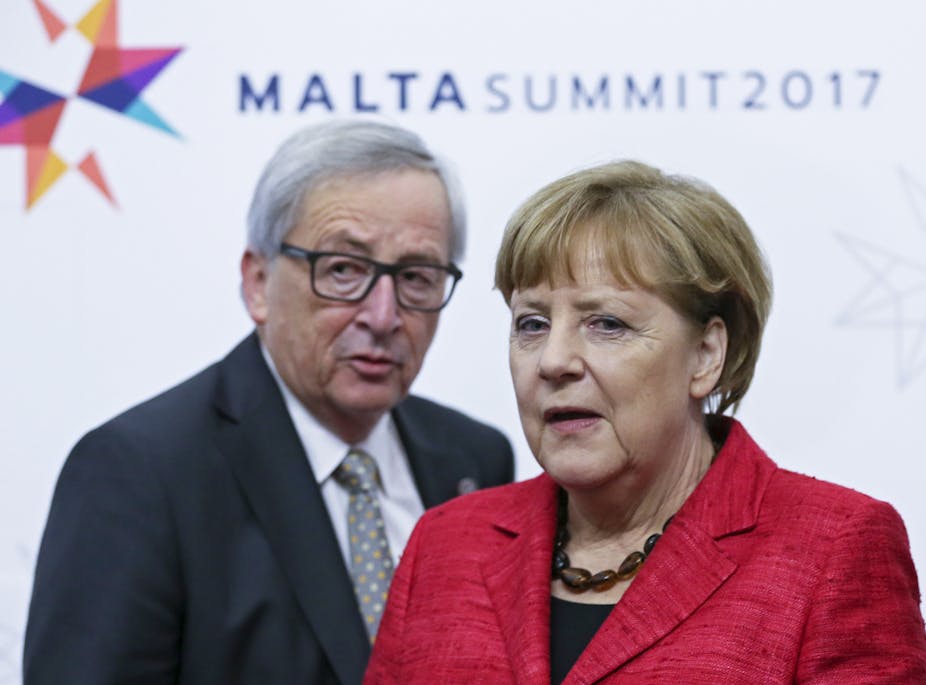The US president’s top trade adviser, Peter Navarro, has accused the German government of manipulating the euro exchange rate and “exploiting” the other countries of the currency zone. This near-rant, that the German government “continues to exploit other countries in the EU as well as the US with an ‘implicit Deutsche Mark’ that is grossly undervalued”, followed quickly on from accusations that the Chinese regime has destroyed US industry by unfair trade practices.
Unlike with China, however, the US does not have a large trade deficit with Germany. The reasons for Trump’s attack on Germany do not appear to be economic. A closer look at Trump’s ideology and the ideology of his advisers, along with the economics, shows that there could be something more underhand at play.
A look at the numbers
America’s trade balance with Germany does not suggest a strong economic motivation for its recent attack. The chart below shows four US trade balances, 1993-2016, with China, Japan and Germany, and the net trade in petroleum.

Until the last few years the US deficit with Germany was the smallest of the four. Over the 24 years the cumulative deficit for Germany (US$986 billion), is half the US deficit with Japan (US$1.8 trillion) and less than a quarter of the Chinese total (US$4.1 trillion).
When we exclude exports and imports of petroleum, commerce with China (including Hong Kong) has since 2007 accounted for well over half the US trade deficit. While the Chinese share rose rapidly after 1990, the Japan percentage was the mirror image of decline, from close to 100% to barely 10%. Over the last two decades the German share has remained in the 10-15% range.
If the new president’s goal is to reduce his country’s trade deficit, going after the German government is the wrong adversary.
Sowing discord in the EU
Trump’s recent selection of Ed Malloch, a virulent opponent of European unity, as ambassador to Brussels suggests that the aggressive attack on German trade policy may be part of a conscious strategy. The criticism of German policy explicitly sought to split off the other members of the eurozone, asserting that they and the US were all victims of German mercantilism.
In the least sinister interpretation, Trump’s aggressiveness towards Germany is an element in a divide-and-conquer trade policy. A Europe divided would make for weaker negotiating partners than trying to strike a deal with the entire bloc. Thus, the president of the European Council, Donald Tusk, included on the agenda at the recent Malta meeting of EU leaders, discussion of the threat that Donald Trump’s US presented to the unity of Europe.
The Trump project to sow discord would seem to have fertile ground in which to grow, due to recent tensions and conflicts within the EU. Tensions continue through the eurozone over the austerity policies advocated so insistently by the German government, with strong objections from an unstable Italian government, and the prospect yet again of a Greek debt default.
Among the non-euro EU countries Trump where has his sympathisers are dubiously democratic leaders, which share his antipathy to Muslim immigrants – Viktor Orbán in Hungary, Andrej Kiska of Slovakia, and the Polish government (which recently invited Trump for an official visit).
Prospect of a trade war?
In practice, European soil may prove less fertile than anticipated by Trump and his far-right, anti-EU adviser Stephen Bannon. As much as the would-be EU authoritarians may approve of a travel ban that targets Muslims, in practice their cooperation may be constrained by anxiety over Trump’s apparent intent to cooperate with the Putin regime. A US-Russian detente, combined with Trump’s criticism of NATO, would likely keep Poland and the Baltic countries firmly in the EU camp.
The early days of Trump’s presidency have taught us not to rule out policies that seem unfeasible or antagonistic. With that caveat in mind, a few judgements seem defensible. First, a US trade war with China is considerably more likely than one with Germany, because the deficit with China is by far the larger. Confronting the Chinese government over trade issues would fit into the broader contest for influence and control of South-East and East Asia.
An attempt to separate Germany from the other EU countries for a trade war, however, would confront a practical problem shown in the following graph.

The US trade deficit with Germany and the other EU countries combined (excluding the UK) has hardly differed over the years. The cumulative total for the former was US$825 billion and the latter US$854 billion. No EU leader is likely to believe that his country would be exempt for very long from US trade sanctions launched against Germany.
More likely than a trade war with Germany, the Trump government will reach a bilateral deal that is relatively favourable to Britain (whose trade balance with the US has been close to zero in recent years). This might lend credibility to a Trump claim that he is singling out Germany for punishment, and would give the other EU members a better trading arrangement than they currently have within the EU. But, for the time being at least, solidarity seems to be holding among the remaining 26 EU countries.

